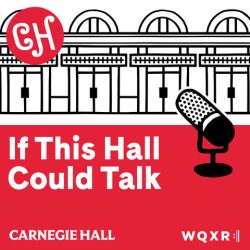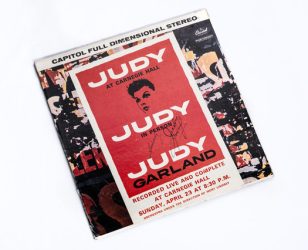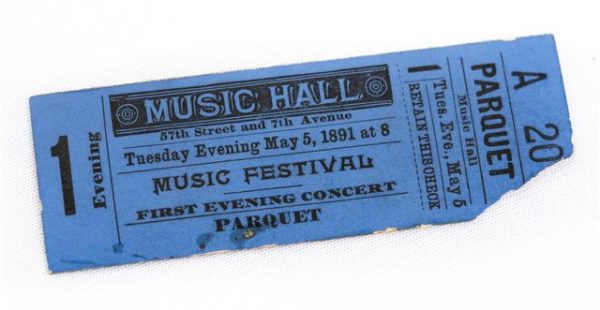Carnegie Hall launches ‘If This Hall Could Talk’ – a podcast series exploring its rich history and lore

For those who love history as much as music, the launch of Carnegie Hall’s new podcast series, ‘If This Hall Could Talk’, is exciting news. Created in collaboration with WQXR and Sound Made Public and hosted by Broadway star Jessica Vosk, the series delves into the legendary and eclectic history of Carnegie Hall. And what a story it is.
The hall is internationally renowned as one of the finest settings for artists and audiences in the world, beloved by musicians for its acoustics, ambience and history. It is almost impossible to imagine that it was threatened by the wrecking ball in the late 1950s. The hall was saved from that fate by the efforts of violinist Issac Stern, philanthropist Jacob Kaplan and the many others who rallied to the cause.
The luminaries of classical music – singers, instrumental virtuosi and the world’s great orchestras – have all performed at Carnegie Hall. The list of popular entertainers is just as exhaustive. Judy Garland’s 1961 concert is the stuff of legend, and the recording of the concert won the Grammy Award for Album of the Year, making Garland the first woman to win the award. It spent thirteen weeks at Number 1 on the Billboard album chart.
Performers from pop to hip hop have appeared at Carnegie Hall. In 1961, the Rat Pack were there to support the work of Dr Martin Luther King, Jr., and the Beatles gave two performances in 1964. Carnegie Hall sponsored a family day with free admission to celebrate the fiftieth anniversary of hip hop.
Political and social history was also made on Carnegie Hall’s stage. Music often played a part but not always. The hall fulfilled the dream of Andrew Carnegie, the man who envisioned and paid for it: ‘It is built to stand for ages, and during these ages it is probable that this hall will intertwine itself with the history of our country. All good causes may find here a platform’.
At the turn of the twentieth century, those causes included women’s suffrage. Over two dozen events were held at Carnegie Hall in support of women obtaining the right to vote, ranging from mass meetings and conventions to lectures and rallies. For each one, women turned out in droves.
In March 1917, the Emergency Peace Federation held its ‘Rally Against US Participation in World War I’ at Carnegie Hall. Less than one month later, Congress passed a war declaration, and organizations such as the American Defense Society were soon holding events like ‘Win the War’ there. Former President Theodore Roosevelt gave a speech entitled ‘Do Your Fighting and Do It Now’ on its stage. On 8 July 1919, President Woodrow Wilson appeared at the hall to deliver his first report on the Treaty of Versailles. Although Wilson was more than three-and-a-half hours late, the nearly 4,000 people rose and cheered for several minutes when he stepped on stage.
Carnegie Hall responded to the Great Depression in 1932, when the economy was in a free-fall and unemployment pushed beyond 23%, by offering free lunchtime concerts. Two years later, together with United Parents Associations of New York City, it presented two series of events for children and young people. One of them featured the Carnegie Hall Circus and Tulsa & Judy, ‘the smallest performing baby elephants in the circus world…3,000 pounds and still they are cute’.
In 1938, as storm clouds again gathered over Europe, Carnegie Hall played host to ‘A Mass Meeting in Protest of Five Years of Hitler Terror’. The hall was packed, and thousands were turned away. In 1942, the hall was again full for ‘Artists’ Front to Win the War’ with the overflow crowd listening on the street to speeches from film stars Charlie Chaplin, Orson Welles and others that urged the US to action.
Carnegie Hall opened on 5 May 1891, with Tchaikovsky conducting his own music in his American debut. In 1943, Toscanini led the NBC Symphony in an all-Tchaikovsky program that raised more than ten million dollars in support of war bonds, a record for fund-raising at a single concert. The manuscript of Toscanini’s arrangement of ‘The Star-Spangled Banner’ was auctioned as part of the benefit.
On 18 May 1976, Carnegie Hall celebrated its eighty-fifth anniversary with the ‘Concert of the Century’, featuring performances by members of the New York Philharmonic, the Oratorio Society of New York, Leonard Bernstein, Vladimir Horowitz, Dietrich Fischer-Dieskau, Mstislav Rostropovich and others.
A decade later, Bernstein was back on stage with James Levine, Yo-Yo Ma, Murray Perahia and four of the greatest opera stars of the era – Leontyne Price, Marilyn Horne, Luciano Pavarotti and Samuel Ramey – in a concert entitled ‘Music for Life.’ It raised $1.7 million in support of the Gay Men’s Health Crisis, a charity that supports people with HIV and AIDS.
There would be other such concerts, including Tony Award–winning singer and actress Bernadette Peters’s Carnegie Hall debut in 1996, again to benefit GMHC. The New York Times called the concert ‘thrilling’.

In eight episodes, ‘If This Hall Could Talk’ will take listeners behind the scenes for a look at the unforgettable performances, fascinating figures and shaping of American culture from the Rose Archives – including Judy Garland’s signed album of her 1961 album, Benny Goodman’s clarinet, Ella Fitzgerald’s glasses, a Women’s Suffrage Party Convention booklet and a T-shirt made solely for the ushers to wear at rock and popular music concerts by such acts as The Beach Boys, Pink Floyd, Joni Mitchell and Chicago.
Along with Jessica Vosk, each podcast features voices that range from marquee musical talents to historical experts – including members of Carnegie Hall’s own Rose Archives team – guiding listeners on a journey through incredible moments that have helped shape the culture in which we live today.
‘If This Hall Could Talk’ is available wherever you get podcasts with new episodes released every other week.
Rick Perdian
Click here to access the ‘If This Hall Could Talk’ podcasts.
Featured Image: Carnegie Hall Opening Night ticket © Chris Lee

Very interesting historical connections beyond music, which one forgets also landed in Carnegie Hall.